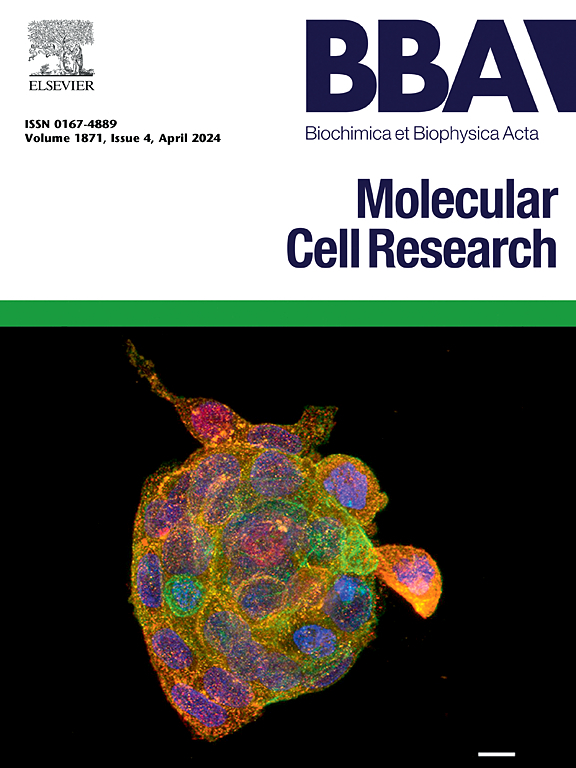Modulation of mitochondrial quality control through autophagic pathway in familial Alzheimer's disease
IF 3.7
2区 生物学
Q1 BIOCHEMISTRY & MOLECULAR BIOLOGY
Biochimica et biophysica acta. Molecular cell research
Pub Date : 2025-07-07
DOI:10.1016/j.bbamcr.2025.120019
引用次数: 0
Abstract
Autophagy is a highly conserved cellular catabolic process recognized as an essential pathway for the maintenance of cellular homeostasis. Growing evidence implicates autophagic dysfunction in the pathogenesis of several neurodegenerative disorders, including Alzheimer's disease (AD), thus its modulation might represent an interesting therapeutic tool. Searching for a compound that stimulates autophagic pathway, led us to identify the inhibitor of RPSA receptor, NSC47924. In this study, we show that, NSC47924 down-modulated Akt-mTOR-axis pathway, the master regulator of autophagy, which was abnormally hyperactivated in fibroblasts from genetic AD-affected patients. Consistently, by monitoring the conversion of LC3, we found that inhibition of RPSA enhanced and restored the compromised autophagic flux. Moreover, by qRT-PCR analysis we found that inhibitor treatment upregulated the expression of autophagy-linked genes.
Importantly, AD-affected fibroblasts exhibited massive mitochondrial network fragmentation and mitophagy defects, which were restored through the stimulation of autophagy induced by RPSA inhibition. Consistent with an efficient elimination of dysfunctional mitochondria, we found that the turnover of both the mitophagy regulators PINK1 and Parkin and the autophagic receptors p62, NDP52, OPTN, was modulated, thus restoring a highly interconnected organelle's network. In addition, the improvement of mitochondrial morphology correlated with a functional recovery, as assessed by Seahorse analysis and mitochondrial ROS production evaluation. Collectively, our findings suggest that RPSA inhibition stimulates an autophagic pathway promoting the efficient removal of damaged mitochondria, favouring the recovery of cellular homeostasis, and counteracting crucial AD pathogenic mechanisms.

家族性阿尔茨海默病自噬途径对线粒体质量控制的调节。
自噬是一种高度保守的细胞分解代谢过程,被认为是维持细胞稳态的重要途径。越来越多的证据表明,自噬功能障碍在包括阿尔茨海默病(AD)在内的几种神经退行性疾病的发病机制中起作用,因此其调节可能是一种有趣的治疗工具。为了寻找刺激自噬通路的化合物,我们确定了RPSA受体的抑制剂NSC47924。在这项研究中,我们发现NSC47924下调了自噬的主要调节因子akt - mtor轴通路,该通路在遗传性ad患者的成纤维细胞中异常亢进。同样,通过监测LC3的转化,我们发现抑制RPSA可以增强和恢复受损的自噬通量。此外,通过qRT-PCR分析,我们发现抑制剂处理上调自噬相关基因的表达。重要的是,受ad影响的成纤维细胞表现出大量线粒体网络断裂和线粒体自噬缺陷,这些缺陷通过抑制RPSA诱导的自噬刺激得以恢复。与功能失调线粒体的有效消除一致,我们发现线粒体自噬调节因子PINK1和Parkin以及自噬受体p62, NDP52, OPTN的更替都被调节,从而恢复了高度互联的细胞器网络。此外,海马分析和线粒体ROS生成评估表明,线粒体形态的改善与功能恢复相关。总的来说,我们的研究结果表明,RPSA抑制刺激自噬途径,促进受损线粒体的有效清除,有利于细胞稳态的恢复,并抵消AD的关键致病机制。
本文章由计算机程序翻译,如有差异,请以英文原文为准。
求助全文
约1分钟内获得全文
求助全文
来源期刊
CiteScore
10.00
自引率
2.00%
发文量
151
审稿时长
44 days
期刊介绍:
BBA Molecular Cell Research focuses on understanding the mechanisms of cellular processes at the molecular level. These include aspects of cellular signaling, signal transduction, cell cycle, apoptosis, intracellular trafficking, secretory and endocytic pathways, biogenesis of cell organelles, cytoskeletal structures, cellular interactions, cell/tissue differentiation and cellular enzymology. Also included are studies at the interface between Cell Biology and Biophysics which apply for example novel imaging methods for characterizing cellular processes.

 求助内容:
求助内容: 应助结果提醒方式:
应助结果提醒方式:


